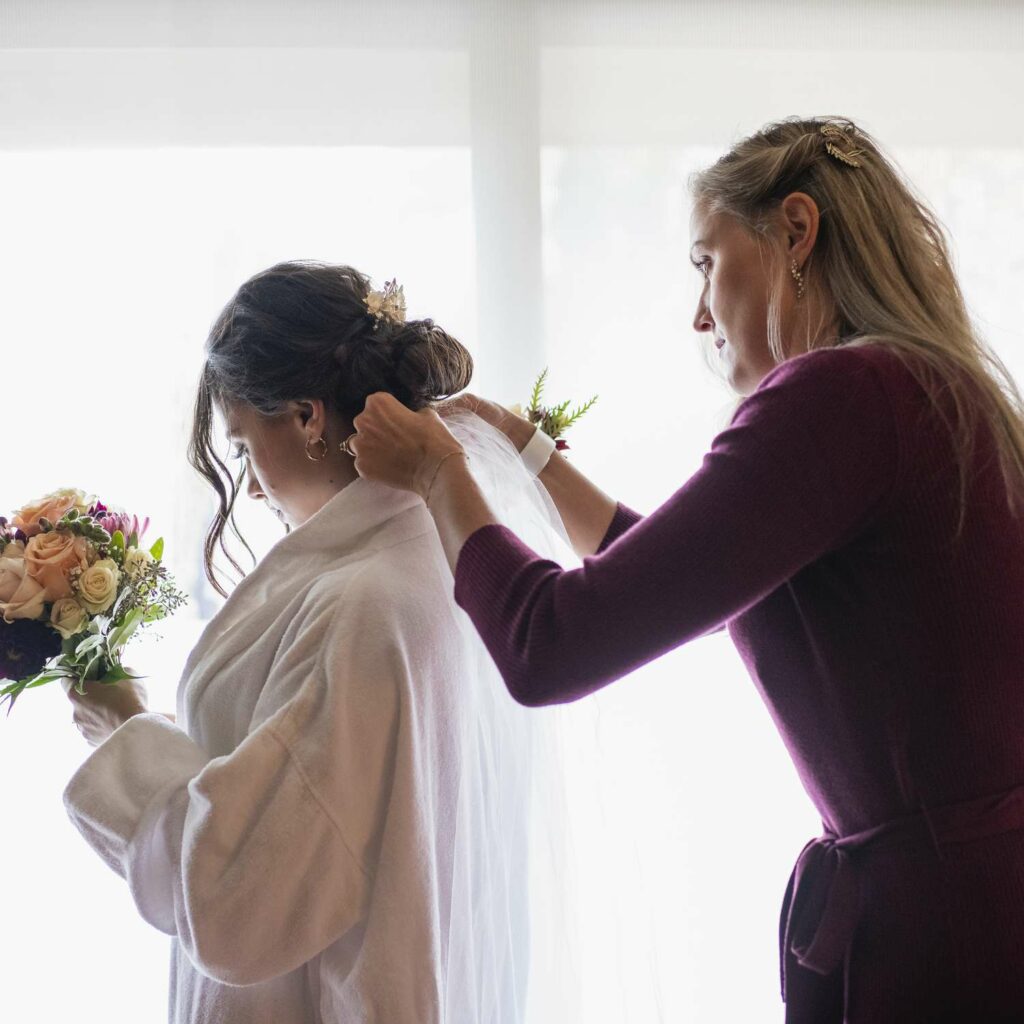A personal attendant and a bridesmaid both play important roles in a wedding, but they have distinct responsibilities. While a bridesmaid focuses on supporting the bride throughout the wedding planning process and on the big day, a personal attendant has a more behind-the-scenes role, assisting with tasks such as managing the guest list, coordinating vendors, and ensuring the smooth flow of events. Understanding the differences between these roles can help brides-to-be make informed decisions when selecting their wedding party.
Weddings are joyous occasions filled with love, celebration, and the coming together of two individuals. Behind the scenes, personal attendants and bridesmaids play crucial roles in ensuring the smooth execution of the big day. While both positions are essential, they differ in their responsibilities and level of involvement. This article aims to shed light on the distinctions between personal attendants and bridesmaids, providing a clear understanding of their respective roles. By clarifying these differences, individuals involved in wedding planning can make informed decisions when selecting their support team.
Personal Attendant Responsibilities
The personal attendant plays a crucial role in assisting the bride throughout the wedding planning process and on the wedding day itself. This section will outline the primary duties and responsibilities of a personal attendant, provide examples of tasks typically assigned to them, and emphasize the personal nature of the role and its focus on the bride’s needs.
Primary Duties and Responsibilities
The personal attendant’s primary responsibility is to provide support and assistance to the bride before, during, and after the wedding. They act as a personal assistant and confidante, ensuring that the bride’s needs are met and that she feels supported throughout the entire wedding journey. The personal attendant is there to alleviate stress and help the bride enjoy her special day to the fullest.
Tasks Typically Assigned to Personal Attendants
Personal attendants are assigned various tasks to help the bride with wedding preparations and ensure a smooth wedding day. Some examples of tasks typically assigned to personal attendants include:
Assisting with wedding dress shopping and fittings: The personal attendant may accompany the bride to bridal boutiques, help her try on dresses, and provide feedback and support during the decision-making process.
Managing wedding-related appointments: This may involve scheduling and coordinating appointments with vendors, such as florists, photographers, and caterers, on behalf of the bride.
Organizing and maintaining the bride’s wedding-related documents: The personal attendant may help the bride keep track of contracts, invoices, and other important paperwork related to the wedding.
Assisting with wedding day preparations: This can include tasks such as packing the bride’s emergency kit, ensuring all necessary items are ready for the wedding day, and coordinating with other members of the bridal party.
Providing emotional support: The personal attendant is there to listen, offer advice, and provide emotional support to the bride throughout the wedding planning process. They may also help manage any pre-wedding jitters or stress the bride may experience.
Attending to the bride’s needs on the wedding day: The personal attendant ensures that the bride is comfortable, hydrated, and has everything she needs on her wedding day. They may assist with tasks such as helping the bride get dressed, holding her bouquet during the ceremony, and ensuring she has breaks to eat and rest.
Emphasis on the Personal Nature of the Role
The personal attendant’s role is deeply personal and focused on the bride’s needs. Unlike bridesmaids who have a more social role, personal attendants are primarily responsible for providing one-on-one support to the bride. They prioritize the bride’s comfort, happiness, and overall well-being throughout the wedding planning process and on the wedding day itself. The personal attendant acts as a trusted companion, ensuring that the bride feels supported and cared for during this significant time in her life.
Bridesmaid Responsibilities
The role of bridesmaids in weddings is deeply rooted in tradition and holds significant importance in supporting the bride throughout the entire wedding journey. Bridesmaids are typically close friends or family members who are chosen by the bride to stand by her side on her special day. Their responsibilities extend beyond just being present at the wedding ceremony and include various tasks and duties that contribute to the overall success of the wedding.
Traditional Role of Bridesmaids
Traditionally, bridesmaids were chosen to provide emotional support to the bride and to act as her confidantes during the wedding planning process. They were responsible for helping the bride with various aspects of wedding preparations, such as selecting the wedding dress, choosing bridesmaid dresses, and assisting with the overall wedding theme and decor. Bridesmaids were also expected to attend pre-wedding events, such as bridal showers and bachelorette parties, to celebrate the bride’s upcoming marriage.
Tasks and Responsibilities
Bridesmaids have a range of tasks and responsibilities that they are expected to fulfill. These may include:
Assisting with Wedding Planning: Bridesmaids often lend a helping hand in the wedding planning process. They may accompany the bride to vendor appointments, offer opinions and suggestions, and help with tasks such as creating wedding invitations or assembling wedding favors.
Dress Shopping: Bridesmaids are typically involved in the process of selecting their own dresses. They may go shopping with the bride to find dresses that complement the overall wedding theme and the bride’s gown.
Attending Pre-Wedding Events: Bridesmaids are expected to attend pre-wedding events, such as bridal showers, engagement parties, and rehearsal dinners. Their presence adds to the celebration and support for the bride.
Emotional Support: Bridesmaids play a crucial role in providing emotional support to the bride. They are there to listen, offer advice, and help alleviate any stress or anxiety the bride may experience during the wedding planning process.
Wedding Day Assistance: On the wedding day itself, bridesmaids have several responsibilities. They may help the bride get dressed, ensure her hair and makeup are flawless, and assist with any last-minute preparations. Bridesmaids also often participate in the processional and recessional during the ceremony.
Supportive Role
Above all, bridesmaids serve as a support system for the bride. They are there to offer encouragement, lend a helping hand, and provide reassurance throughout the entire wedding journey. Bridesmaids play a vital role in making the bride feel loved, cherished, and supported on her special day. Their presence and assistance contribute to creating a memorable and joyous wedding experience for the bride and groom.
Comparison of Responsibilities
Personal attendants and bridesmaids have distinct roles and responsibilities within a wedding. While both positions are important, they differ in their primary focus and tasks.
Personal Attendants
Personal attendants primarily focus on the bride’s personal needs throughout the wedding planning process and on the wedding day itself. They act as the bride’s right-hand person, providing support and assistance in various aspects.
Personal attendants typically assist with tasks such as:
– Attending dress fittings and helping the bride choose her wedding attire
– Accompanying the bride to hair and makeup trials
– Assisting with addressing and sending out wedding invitations
– Helping the bride with any last-minute preparations or errands
– Ensuring the bride stays hydrated and eats during the wedding day
– Managing the bride’s personal belongings and ensuring she has everything she needs
– Providing emotional support and calming the bride’s nerves
Bridesmaids
Bridesmaids, on the other hand, have a broader range of responsibilities that extend beyond the bride’s personal needs. They play a crucial role in supporting the bride and ensuring the overall success of the wedding.
Bridesmaids typically have the following responsibilities:
– Assisting with wedding planning tasks, such as attending vendor meetings and helping with decorations
– Organizing and participating in pre-wedding events, such as bridal showers and bachelorette parties
– Helping the bride choose bridesmaid dresses and coordinating fittings
– Participating in the wedding rehearsal and ensuring everyone knows their roles
– Supporting the bride emotionally and providing moral support throughout the wedding planning process
– Assisting with any last-minute preparations on the wedding day, such as setting up the venue or managing guest seating
– Participating in the bridal party processional and recessional during the ceremony
Complementary Roles
While personal attendants and bridesmaids have different responsibilities, their roles complement each other to ensure a smooth wedding experience.
Personal attendants focus on the bride’s personal needs, providing dedicated support and assistance. They prioritize the bride’s comfort, well-being, and emotional state, ensuring she feels taken care of throughout the wedding day.
Bridesmaids, on the other hand, have a more comprehensive role in supporting the bride and contributing to the overall success of the wedding. They assist with various tasks, from planning to execution, and provide a broader support system for the bride.
By working together, personal attendants and bridesmaids create a cohesive team that helps alleviate stress and ensures that the bride’s needs are met. Their distinct roles and responsibilities complement each other, resulting in a memorable and enjoyable wedding experience for all involved.

